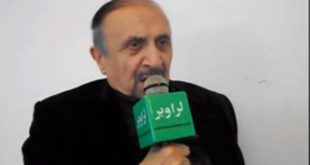Transmitters are unsophisticated and cheap to make
With mullahs and militants using the air waves to broadcast propaganda against their opponents and Western governments, illegal FM radio stations have mushroomed in Pakistan’s north-west.
The content of these FM radio stations vary.
Some are run by local mullahs who want to spread religious information. They use the radio as an informal “distance learning” programme.
 Transmitters are unsophisticated and cheap to make. |
The aim is to educate people who have little chance of getting a formal education.
In some cases, the target audience is mainly women who are not usually allowed to go to mosques or learn face-to-face from a male teacher.
However, a large number of FM stations are run by “fire-brand” clerics who mix religion with politics and preach against the West.
Some illegal FM radio stations also criticise the Pakistani army’s operations in the region and threaten tribesmen with dire consequences if they help the government fight the Taliban.
FM mullahs
 It is believed that there are about 150 illegal FM radio stations in the North West Frontier Province (NWFP) and the adjacent tribal areas.
It is believed that there are about 150 illegal FM radio stations in the North West Frontier Province (NWFP) and the adjacent tribal areas.
The pirate stations are mainly based in madrassas or religious seminaries, mosques and the compounds of militant leaders, but they often move to different locations to avoid detection.
Popularly known as “FM mullahs” they condemn everyone and everything that goes against their interpretation of religion.
“There aren’t many sources of entertainment and information in this region. FM radio is an easy – and in some cases the only – option people have,” says Khadim Hussain, a research fellow at the Peshawar-based Ariana Institute for Regional Research and Advocacy (AIRRA).
“Electricity is not available all the time and television can’t be watched. In many areas, there are no or very few television cable operators. You just need a small radio set and the mullah is already there talking to you,” he adds.
Radio Militant
Militant Taliban have also been using their FM radio transmitters to issue warnings and directives to local people. They have demanded that local politicians, security forces and some other officials resign to protest against the military operations.
”There are areas where we dare not go to confiscate the transmitters for the fear of being attacked” Pakistani government official |
Tide turns against the Taliban
“The Taliban have used radio in a clever way to increase their influence and intimidate the general population,” says retired Brigadier Mahmood Shah.
“Of course, the illegal stations have contributed a lot to the spreading of militancy. They issue instructions on the radio to their fighters and used it to recruit and organise them,” he says.
In many areas, listening to militant Taliban radio stations is hardly a matter of choice, but a way of avoiding the possible wrath of Taliban militants.
“We listen to the Taliban FM radio to keep ourselves informed of their policies and latest instructions,” says a resident of Dara Adam Khel in the Khyber tribal agency.
Setting up an illegal FM radio is cheap and easy.
All you need is a transmitter the size of a small box and an antenna that can be put on a tree or a minaret.
Former government officials are said to earn a living setting them up.
The cost of these FM transmitters range from $60 (£36.50) to $185 (£112).
In Pakistan, legal FM radio licences are generally awarded through an open bidding process and normally costs tens of thousands of dollars in fees, equipments and offices.
The Pakistan Electronic Media Regulatory Authority (Pemra) says that operating an illegal FM radio station is an offence and is punishable by jail and/or a fine.
And while the culprits usually go unpunished, Pemra says that it did manage to close more than 160 illegal FM radio transmitters last year in the NWFP alone.
But they also admit that operators start all over again by buying a new transmitter and finding a new frequency.
“It is a sensitive issue. Most of these FMs broadcast religious material and the authorities do not want to take the risk of provoking a reaction,” said one official who wanted to remain anonymous.
“There are areas where we dare not go to confiscate the transmitters for the fear of being attacked,” said the same official.
Some people have suggested that Taliban FM stations should be jammed but Pemra officials say that would only go part of the way to solving the problem.
“If we widely use jammers, then legal frequencies will also close. Sometimes they overlap with legal and government FM frequencies,” says Dr Abdul Jabbar of Pemra.
“The government has made rules for launching an FM radio station but it does not have a strategic approach about the contents of these FM broadcasts,” says Khadim Hussain.
“It is a big problem and needs a comprehensive study and proper control.”
— ———
 لراوبر ویب پاڼه لراوبر يو افغان – تازه خبرونه
لراوبر ویب پاڼه لراوبر يو افغان – تازه خبرونه


